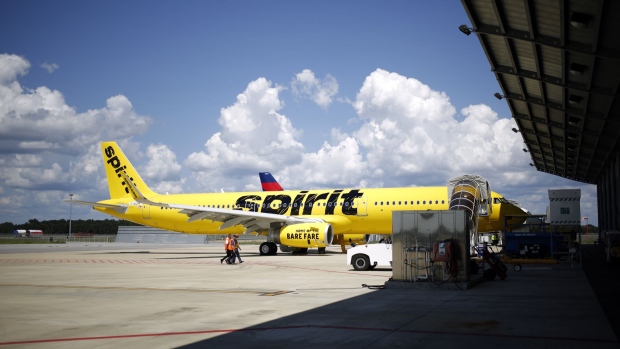Apr 8, 2024
Spirit Airlines Defers Airbus Deliveries, to Furlough Pilots
, Bloomberg News

(Bloomberg) -- Spirit Airlines Inc. announced an extensive cost-cutting program, pushing out the delivery of some new aircraft into the next decade and planning pilot furloughs, less than three months after its proposed combination with JetBlue Airways Corp. was blocked over antitrust concerns.
The airline will defer all its Airbus SE aircraft that were to be delivered in 2025 and the following year until 2030 and 2031, improving Spirit’s liquidity by about $340 million over the next two years, the carrier said in a statement Monday. The airline will also furlough 260 pilots from Sept. 1, it said.
Spirit is working to shore up its finances after the $3.8 billion sale to JetBlue was blocked by a federal judge who found it hurt competition and would raise fares. The carrier has bled cash over much of the past two years as it contended with uneven demand, engine issues and higher costs plaguing the US domestic market.
“Spirit Airlines’ aircraft deferrals and pilot furloughs look positive, in terms of helping the carrier to reduce” or defer some costs, Stephen Trent, a Citi analyst, said in a note. “However, among other factors, the carrier now potentially also reduces its revenue generation opportunities.”
The delivery delays will reduce Spirit’s available seats by 7% at the end of 2025 and 16% by year-end 2026, according to Savanthi Syth, a Raymond James analyst.
Spirit rose 5% to $4.65 as of 1:50 p.m. in New York. The shares are down about 72% this year, while the Standard & Poor’s Supercomposite Airlines Index is up 8.8%.
“Deferring these aircraft gives us the opportunity to reset the business and focus on the core airline while we adjust to changes in the competitive environment,” Chief Executive Officer Ted Christie said in the statement.
The deferrals don’t include two leased planes that will be delivered in the second and third quarters of next year. The agreement also doesn’t change the total number of planes ordered from Airbus or existing options, Spirit said, and doesn’t alter plans for aircraft arriving in 2027 through 2029.
“The ramifications of the company’s announced decision are deeply troubling for our entire pilot group,” the Air Line Pilots Association union said in a statement. Union leadership is exploring voluntary measures that could eliminate or reduce the need for furloughs, it said.
Spirit is likely to offer voluntary leaves for flight attendants this summer, the Association of Flight Attendants-CWA said in a statement to members. “Hundreds” of flight attendants already are on such leaves with paid benefits, AFA said. The leaves can range from one month to one year.
The airline announced an order for 100 Airbus A320neo aircraft in October 2019, with an option for 50 more, most of which are yet to be delivered. The plane is the most popular commercial aircraft flown today, and Airbus is practically sold out of the jet until the next decade. By the end of last year, Spirit had 205 Airbus planes in its fleet.
A manufacturing defect in engines made by RTX Corp.’s Pratt & Whitney unit will ground Spirit planes throughout this year, ranging from an average of 13 this month and climbing to 40 by December as they undergo lengthy repairs. This issue and the retirement of Airbus A319 planes has left Spirit “with more pilots than its operations require,” the union said.
As of 9 a.m. Monday, the prices of Spirit’s publicly traded debt had not changed in response to the announcement. Spirit’s secured notes last traded around 76 cents on the dollar while its unsecured notes last changed hands at 74 cents and just below 50 cents, according to data compiled by Bloomberg.
Financial Maneuvers
The cost-cutting announcement comes as Spirit considers options for how to address debt maturities due in 2025 and 2026. The airline’s rate of cash-burn and dwindling liquidity makes the typical paths such as repaying or refinancing the debt appear challenged, potentially leaving the airline and lenders to restructure its roughly $3 billion in borrowings.
Any creative maneuvers the company undertakes as part of financial restructuring seem poised to break new ground as part of Spirit’s capital structure includes bonds backed by its frequent flyer program. Debt backed by loyalty programs became a common way for cash-strapped airlines to raise capital during the pandemic, but no airlines that issued debt this way in recent years have gone through a restructuring.
A group of Spirit’s lenders earlier presented the airline with a proposal that would involve asserting a “triple-dip” legal claim, which market observers say has never been seen before in corporate debt negotiations, Bloomberg previously reported.
The airline reiterated that it has retained Perella Weinberg & Partners and Davis Polk & Wardwell as advisers and is assessing options to refinance upcoming debt maturities and bonds.
--With assistance from Erin Hudson.
(Updates with comments from unions beginnin in ninth paragraph)
©2024 Bloomberg L.P.


